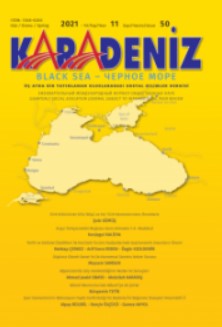THE POLITICAL EMPHASIS OF THE GEORGIAN-OSSETIAN ETHNIC CONFRONTATION OF THE 1918-1921 AND THE COLONIALIST NATURE OF THE SOVIET RUSSIA
THE POLITICAL EMPHASIS OF THE GEORGIAN-OSSETIAN ETHNIC CONFRONTATION OF THE 1918-1921 AND THE COLONIALIST NATURE OF THE SOVIET RUSSIA
Author(s): Aleksandre MgebrishviliSubject(s): Political history, Government/Political systems, Studies in violence and power, Pre-WW I & WW I (1900 -1919), Interwar Period (1920 - 1939), Inter-Ethnic Relations, Geopolitics, Peace and Conflict Studies
Published by: Kültür Ajans Tanıtım ve Organizasyon
Keywords: ethno-conflicts; occupation; territorial integrity; Georgia-Ossetian; Soviet Russia; Bolshevism;
Summary/Abstract: The confrontation of the Ossetians residing in Georgian territories against the Georgian population had taken intense nature during the first decade of the past century, whereas it had become seldom, that Ossetians had raided local population and conducted violent acts, which aimed at weakening the defensive capabilities of the country, dismantling the economy, destruction of the material-cultural sites, intimidation and driving to despair of the local population. It is thus worth noting that the Georgian side, on the one hand had hesitated to undertake critical measures, whereas, on the second hand, they had asked to impose some sanctions against the Ossetians. The reactive wing of the strengthened Ossetian ethno-element had started the anti-state activities and had abused the trust of the Georgian Democratic republic. The events had occurred as according the given scenario for some time, as there had been open demonstration of the aggression, they had treated the Constituent Assembly of Georgia unmannerly, had shown hostile attitude and undermined the sovereignty of the newly established republic. The government had forced to use military operations against the rebels in order to counter their illegal actions and establish order. The operation had been overseen by Giorgi Kvinitadze and Valiko Jugeli. It could be noted that the military actions of 1918-1920, which is widely known as Ossetian rebellions, was in fact actions of the Ossetian Bolsheviks backed by the Russian government, which had nothing to do with the peaceful Ossetian population’s attitudes towards Georgia, as no Ossetians residing in Georgia had taken part in the mentioned actions. Every measure taken by the Bolsheviks had aimed at weakening the Georgian statehood, which would ease the way for the Russian government to widen their sphere of interest.
Journal: Karadeniz Uluslararası Bilimsel Dergi
- Issue Year: 2021
- Issue No: 50
- Page Range: 319-332
- Page Count: 14
- Language: English

